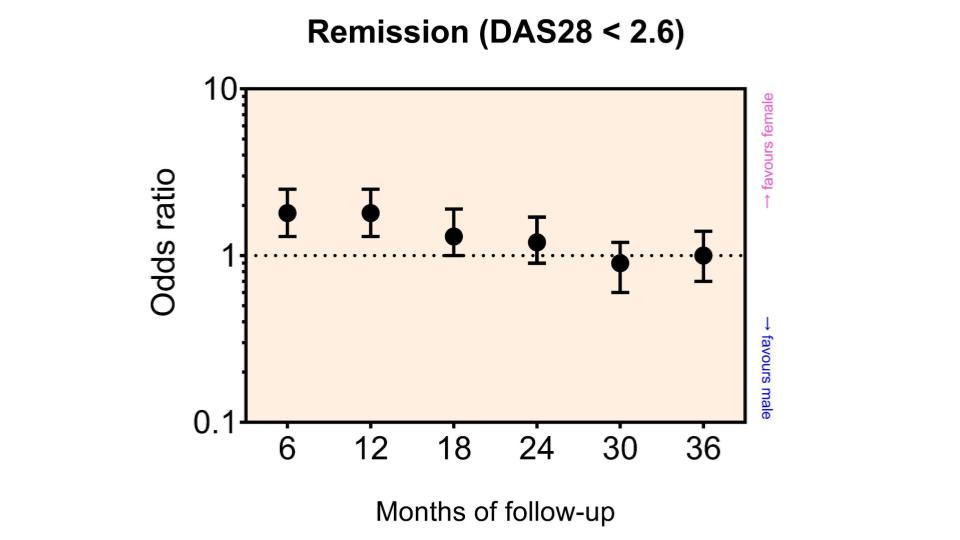Session Information
Session Type: Poster Session B
Session Time: 10:30AM-12:30PM
Background/Purpose: To explore the influence of the rheumatologist’s sex on long-term outcomes in patients with rheumatoid arthritis (RA) undergoing biologic therapy.
Methods: This is a prospective, single-center cohort study conducted on adult RA patients treated with b/tsDMARDs between 2014 and 2022. The sex of the rheumatologist was determined and used as the main variable, while the physician’s age and clinical experience were considered as effect modifiers. All relevant data were collected by an independent investigator and anonymized before final analysis. The association between the physician’s sex and outcomes was assessed using multivariable regression with generalized estimating equations.
Results: The analysis included 1171 patients (81% women) with a mean age of 57 years, a mean disease duration of 14 years, and a median observation of 4 years. At the time of inclusion, 68% of the patients had moderate or high disease activity (DAS28). Multivariate analyses showed that patients treated by female rheumatologists had a significantly lower DAS28 score (p< 0.001) and a higher likelihood of DAS28-remission (aOR 1.29, 95% CI 1.16-1.42; p< 0.001) compared to those treated by male rheumatologists (Figure). This effect was attributed to lower CRP levels (5.4 mg/L, 95% CI 4.9-6.0 vs. 6.4 mg/L, 95% CI 5.9-6.9; p< 0.001) and not to differences in PGA or joint counts. There were no significant differences in glucocorticoid use between physicians of the two sexes. Radiographic progression was less frequent in patients treated by female rheumatologists, but the effect diminished when considering clinical experience.
Conclusion: The sex of the rheumatologist can significantly influence disease control in RA patients, with female rheumatologists achieving better outcomes in terms of disease activity and remission. These findings highlight the importance of considering physician characteristics in the therapeutic management of RA patients.
DAS28, disease activity score in 28 joints; RA, rheumatoid arthritis.
To cite this abstract in AMA style:
Giollo A, Salvato M, Zen M, Andrea d. Long-Term Outcomes Based on the Sex of the Rheumatologist in a Prospective Cohort of RA Patients Receiving Biological Therapies [abstract]. Arthritis Rheumatol. 2024; 76 (suppl 9). https://acrabstracts.org/abstract/long-term-outcomes-based-on-the-sex-of-the-rheumatologist-in-a-prospective-cohort-of-ra-patients-receiving-biological-therapies/. Accessed .« Back to ACR Convergence 2024
ACR Meeting Abstracts - https://acrabstracts.org/abstract/long-term-outcomes-based-on-the-sex-of-the-rheumatologist-in-a-prospective-cohort-of-ra-patients-receiving-biological-therapies/

